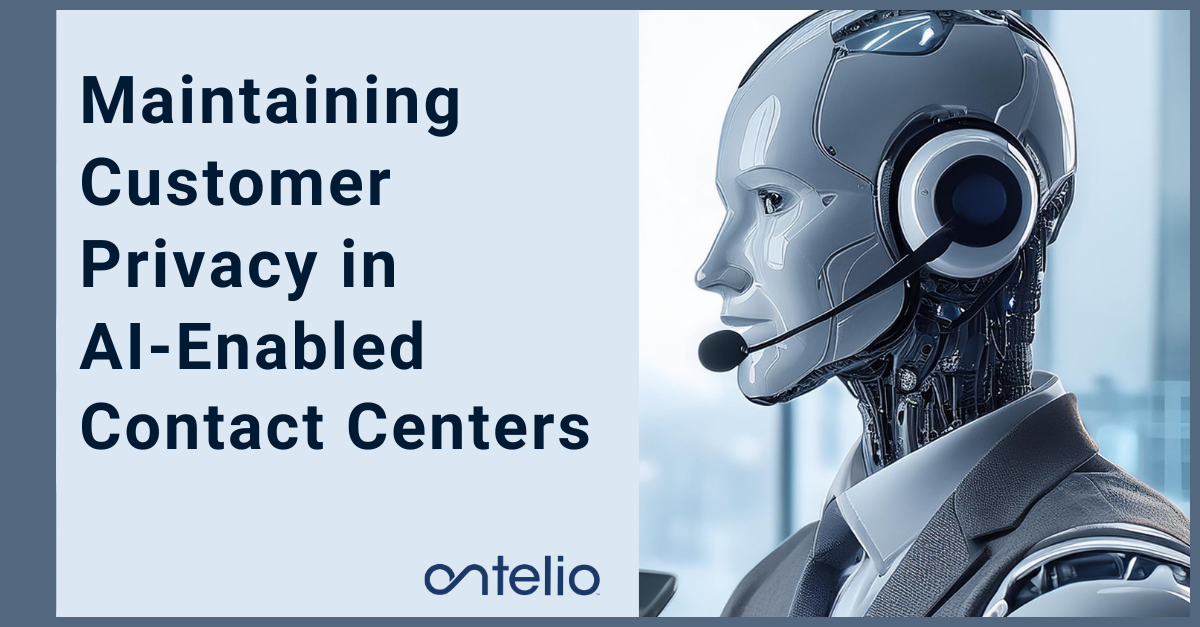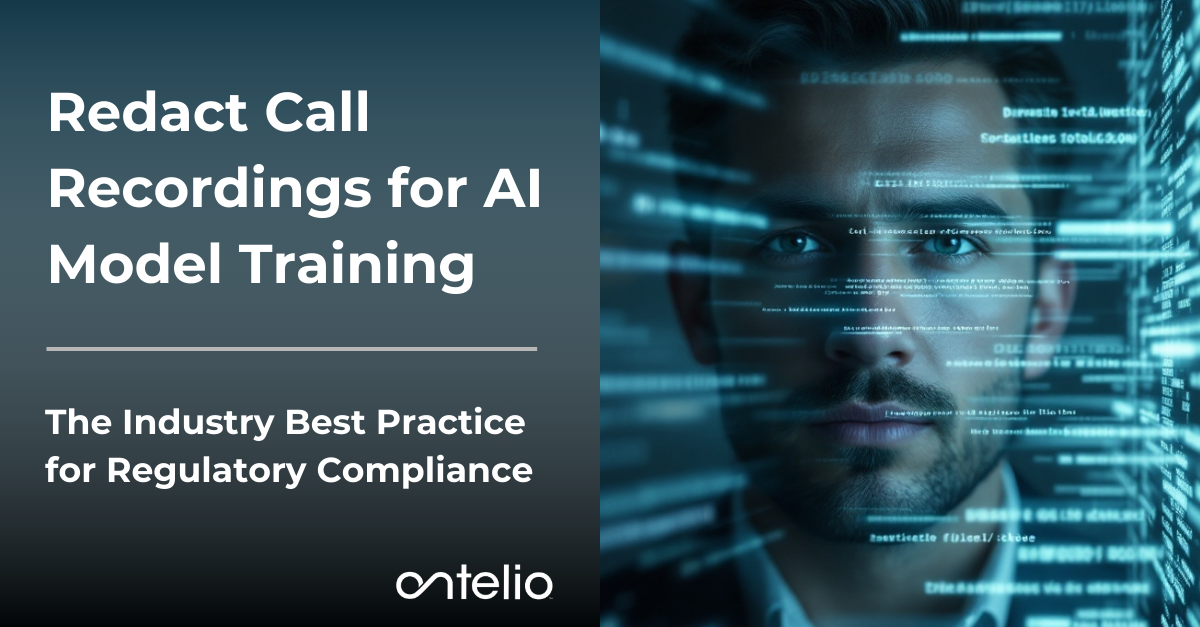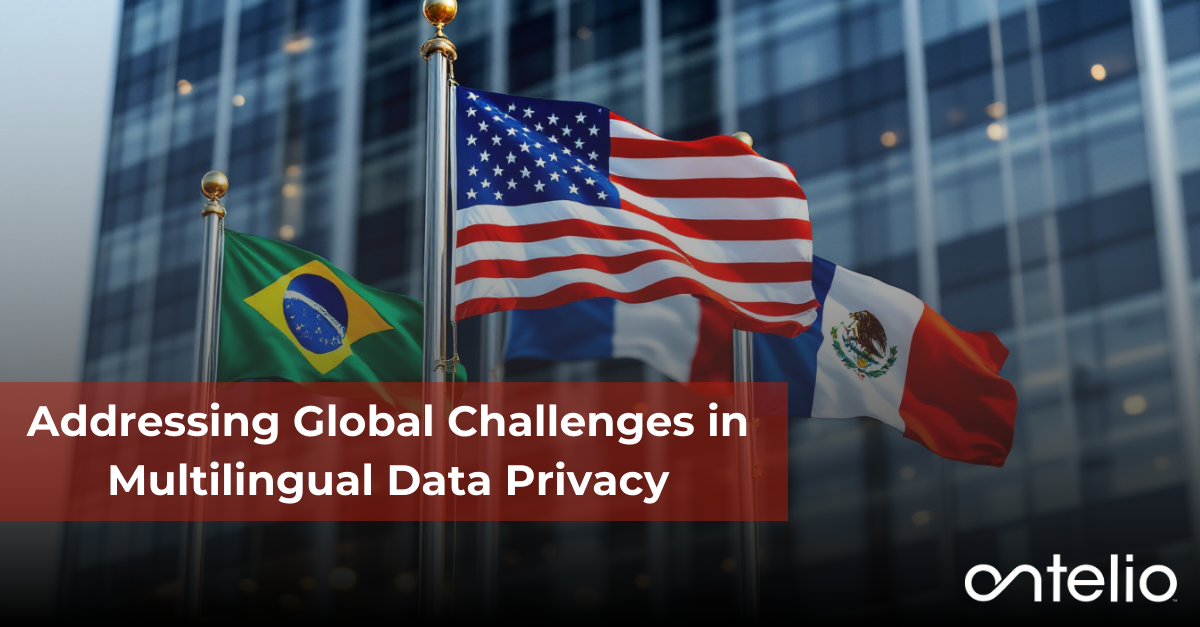Maximizing ROI for Regulatory Compliance and AI Model Training
Today organizations face constant pressure to safeguard customer information while navigating a maze of regulatory requirements. Compliance is not...
6 min read
Marcel Fournier Jul 29, 2024 8:54:34 AM

Contact centers have positioned themselves at the vanguard of technological advancement, especially in harnessing artificial intelligence (AI) to elevate customer service and operational efficiency. Ontelio, a pioneer in integrating AI within the contact center industry, epitomizes the confluence of innovation and privacy, recognizing the imperative balance between leveraging data for AI training and upholding the highest standards of customer privacy. This blog post explores the intricacies of utilizing call recording transcripts for AI model training while adhering to stringent regulations such as the General Data Protection Regulation (GDPR), the Health Insurance Portability and Accountability Act (HIPAA), and the Payment Card Industry Data Security Standard (PCI DSS). Through strategic implementation of data redaction and a steadfast commitment to privacy, contact centers can cultivate trust, ensure regulatory compliance, and unlock the transformative potential of AI in customer interactions.
The exploitation of call recordings to train AI models presents a fertile opportunity to augment the capabilities of contact centers. These recordings, teeming with data, can markedly enhance customer service, agent performance, and overall operational efficacy. Nonetheless, this method introduces significant privacy concerns, particularly under the GDPR, HIPAA, and PCI DSS, which dictate strict protocols for managing personal data, health information, and payment details, respectively.
The GDPR, which oversees the privacy and protection of personal data within the European Union, champions the principles of data minimization and purpose limitation. For contact centers, this signifies that any utilization of personal data, including for AI training, must be indispensably necessary and explicitly defined. The challenge emerges in harnessing valuable customer data for AI enhancements while safeguarding individual privacy rights.
For contact centers engaged with the healthcare sector, adherence to HIPAA is critical. This regulation ensures the privacy of individual health information, demanding rigorous measures to prevent unauthorized access or disclosure. Employing call recordings in these scenarios necessitates meticulous de-identification of protected health information (PHI) prior to any AI training endeavors.
Contact centers that process payment information are obligated to comply with PCI DSS, which sets forth standards for securing cardholder data. The training of AI models with call recordings containing payment details requires thorough data redaction protocols to prevent the exposure of sensitive information, whether intentional or unintentional.
Ontelio champions a holistic approach to preserving customer privacy during AI model training, centered around strategic data redaction and the adoption of privacy-by-design principles.
Data redaction entails the removal or obfuscation of specific data elements within a dataset to protect sensitive information. In the realm of call recordings, this process involves identifying and eliminating personally identifiable information (PII), PHI, and payment details prior to AI training. Advanced AI-based tools and technologies can automate this process, ensuring both precision and efficiency. Consequently, contact centers can employ de-identified datasets that retain valuable insights for AI model training without compromising customer privacy.
Embracing a privacy-by-design framework entails incorporating privacy considerations into the development and operation of AI systems from the beginning. This methodology guarantees that privacy is not merely an afterthought but a fundamental aspect of AI initiatives. Essential elements include:
Audio and transcript redaction is paramount in the contact center ecosystem, particularly when training AI models with call recordings. This procedure entails the careful removal or anonymization of sensitive information from both audio files and their corresponding transcripts, encompassing personally identifiable information (PII), protected health information (PHI), payment card information (PCI), and other data protected under privacy laws.
Robust audio and transcript redaction processes enable organizations operating contact centers to comply with a wide array of privacy regulations, including, but not limited to, the GDPR, HIPAA, PCI DSS, the California Consumer Privacy Act (CCPA), the Virginia Consumer Data Protection Act (VCDPA), and Brazil’s General Data Protection Law (LGPD). By ensuring the anonymization or pseudonymization of personal data extracted from call recordings for AI training, redaction aligns with data minimization and privacy-by-design principles, thereby facilitating regulatory compliance and safeguarding patient privacy.
The integration of AI in data redaction processes offers a sophisticated solution to the challenge of maintaining privacy while leveraging call recordings for AI training. AI algorithms can be trained to identify and redact sensitive information with a high degree of accuracy, significantly reducing the risk of human error. This precision is crucial in ensuring that no personally identifiable information, protected health information, or payment details slip through the cracks. Moreover, AI-driven redaction can process vast amounts of data at scale, enhancing efficiency and enabling contact centers to handle larger datasets without compromising on privacy standards.
A robust data governance framework is essential for managing the complexities of data privacy in the context of AI model training. Such a framework should encompass policies, procedures, and standards for data collection, storage, processing, and sharing, ensuring that all activities are conducted in compliance with relevant privacy regulations. Key components of a strong data governance framework include:
As contact centers continue to evolve in their use of AI technologies, the importance of balancing innovation with privacy will only increase. The deployment of AI in customer service offers unparalleled opportunities for enhancing the customer experience, from personalized service delivery to predictive analytics for anticipating customer needs. However, this technological evolution must be underpinned by a steadfast commitment to privacy and data protection.
Ethical considerations are at the heart of deploying AI in contact centers, particularly regarding privacy and data usage. Organizations must navigate these ethical waters with care, ensuring that AI is used in a manner that respects customer privacy and aligns with societal values. This includes ethical data sourcing, transparency in AI operations, and mechanisms for customer consent and control over their data.
Emerging technologies, including blockchain and homomorphic encryption, offer promising avenues for enhancing privacy in AI operations. Blockchain can provide a secure and transparent framework for data transactions, ensuring integrity and traceability. Homomorphic encryption allows for the processing of encrypted data without the need to decrypt it, offering a new paradigm for privacy-preserving AI model training.
The intersection of AI and privacy in contact centers presents both challenges and opportunities. By embracing strategic data redaction, privacy-by-design principles, and robust data governance frameworks, contact centers can navigate the complexities of regulatory compliance and customer trust. The future of contact center operations lies in harnessing the power of AI to enhance customer experiences while steadfastly protecting customer privacy. As technology continues to advance, the commitment to ethical practices and privacy protection will be paramount in shaping the future of customer service in the digital age.
If you're ready to elevate your contact center's capabilities while maintaining the highest standards of customer privacy, Ontelio is here to guide you every step of the way. Our team is dedicated to helping organizations like yours navigate the complexities of AI integration and data privacy, unlocking new opportunities for innovation and growth.
Contact us today to schedule a consultation and learn how Ontelio can transform your contact center operations. Together, we can redefine what's possible in customer service excellence.

Today organizations face constant pressure to safeguard customer information while navigating a maze of regulatory requirements. Compliance is not...

In the age of AI and data-driven insights, businesses face the dual challenge of leveraging vast amounts of data for customer experience (CX)...

As organizations expand globally, the complexity of managing data privacy across multiple languages and jurisdictions intensifies. Contact centers...